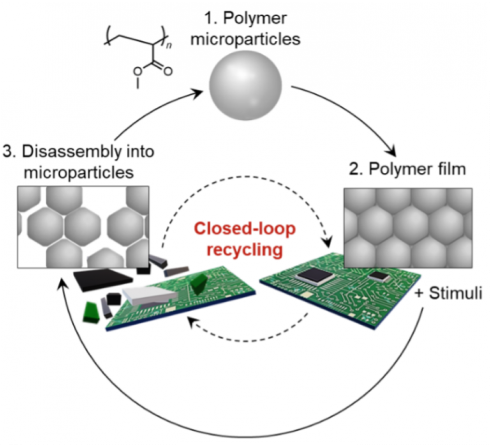A significant amount of plastic waste is incinerated or disposed of in landfills. This harms the environment and wastes vital resources.

Image Credit: Shinshu University
Japanese scientists recently proposed a “closed-loop” recycling process based on polymer microparticles. It creates completely recyclable polymer films with high mechanical stability and fracture energy that retain their mechanical properties after recycling.
The massive production of plastic solid waste has led to global plastic pollution on land and in the oceans. Plastic waste is expected to almost double in the next 20 years, causing additional environmental issues. Currently, large amounts of plastic waste are incinerated or disposed of in landfills.
In this light, recycling plastics as polymers is a long-term waste management solution. However, this involves the degradation of chemical bonds between monomers (polymer building blocks), which reduces their general stability and quality. In response to this concern, scientists have created methods for recycling polymers in a “closed loop,” i.e., without losing these properties.
However, these methods are complicated and costly, and they necessitate the use of specialized monomers, warranting further innovation.
A team of scientists guided by Daisuke Suzuki, an Associate Professor at Shinshu University, recently suggested a closed-loop recycling process based on polymer microparticles in this direction. Their research, co-authored by Shinshu University’s Dr. Takumi Watanabe and Dr. Haruka Minato, was published in the journal Green Chemistry.
Recycling materials without deterioration (closed-loop recycling) is attractive in terms of reducing anthropogenic waste. However, this currently remains very difficult given that there usually is a trade-off between mechanical stability and degradability of polymer materials. Our material recycling concept with microparticles enables the recycling of a huge amount of functional polymer materials that we use in our day-to-day lives and has the potential to solve the problems of resource depletion and environmental pollution.
Daisuke Suzuki, Associate Professor, Shinshu University
The researchers designed polymer microparticles in their study by polymerizing methyl acrylate (MA) monomers in water using aqueous emulsion polymerization. These clumped together to form a solution with uniform spherical poly-MA microparticles.
The solution was then dried to form a thin polymer film with physical (rather than chemical) cross-linking between the microparticles, which could be obtained again by dissolving the film in ethanol. These recycled microparticles could then be used to create a variety of recycled materials.
The films created in this research have many desirable properties that they retain after recycling. They are tough because they have high mechanical stability and fracture energy. The latter property increases as the interfacial thickness of the poly-MA microparticles increases. This reduces the degree of interparticle cross-linking but enhances it when the film is heated.
By combining the microparticles with silica nanofillers, the scientists increased the fracture energy of the polymer films even further. Furthermore, the addition of colored pigments gave the resulting composite films tunable optical properties that did not degrade when recycled.
These findings imply that closed-loop recycling based on polymer microparticles will allow polymers and a variety of other composite materials containing polymer microparticles to generate adhering interfaces between their various layers.
Our concept can lead to the production of fully recyclable films with high fracture energy. Therefore, it will enable the recycling of huge amounts of various polymer materials, thus reducing plastic waste and potentially solving the problems of environmental degradation and plastic pollution.
Daisuke Suzuki, Associate Professor, Shinshu University
The “closed”-loop recycling strategy undoubtedly “opens” new avenues for the efficient and long-term recycling of polymer materials!
Journal Reference
Watanabe, T., et al. (2023). Closed-loop recycling of microparticle-based polymers. Green Chemistry. doi.org/10.1039/D3GC00090G.